Internal Stillness in the Age of Constant Movement
Keywords:
Silence, Mental and Emotional Landscapes, Silence, Mental, EmotionalAbstract
This paper argues for the importance of cultivating the ability to stop and internally yield, particularly at this time in history when we are, in the words of theologian Boff, at a point of socioecological crisis. We are ideologically polarized as humans; meanwhile, we are increasingly aware of how destructive human behavior has been for the world’s poor, for the Earth’s ecosystems, for the Earth itself. There is a desire for peace amid torrents of real and fabricated information coming from social media sites, the internet and television. Never has it been more difficult to stop. Yet, if we can learn to stop internally, I argue that we will become capable of insight and imagination that would otherwise be unavailable to us. Through a contemplative posture of ‘awaiting,’ we will become not only better grounded in reality, but we will be better capable of addressing the socioecological crisis we face today.
References
Althaus-Reid, M.(2002). Queer I stand: Doing feminist theology outside the borders of colonial decency. Yearbook of the European Society of Women in Theological Research, 10, 23-36.
Boff, L. (2007). Essential Care: An Ethics of Human Nature (A. Guilherme, Trans.). London, UK: SPCK.
Bourgeault, C. (2008). The Wisdom Jesus: Transforming heart and mind – A new perspective on Christ and His message. Boston (MA): Shambhala.
Cannon, K. (2001). The Womanist Theology Primer: Remembering What We Never Knew: The Epistemology of Womanist Theology. Louisville (KY): Women’s Ministries Program Area, National Ministries Division, Presbyterian Church (U.S.A.).
Copeland, S. (2012). The critical aesthetics of race. In L. Cassidy and M. H. O’Connell (Eds.) She Who Imagines: Feminist Theological Aesthetics. Collegeville (MN): Liturgical Press, 73-85.
Delio, I. (2012). An interview with IlliaDelio, OSF: Seeing Christianity as a religion of evolution & the implications for religious life. LCWR Occasional Papers,5.
De Mello, A. (1995). The way to love: The last meditations of Anthony De Mello. New York (NY): Doubleday.
FitzGerald, C. (2000). The desire for God and the transformative power of contemplation. In M. R. Brennan, M. H. MacKinnon, M. McIntyre and M. E. Sheehan (Eds.), Light Burdens, Heavy Blessings: Challenges of Church and Culture in the Post Vatican II Era. Quincy (IL): Franciscan Press, 202-222.
FitzGerald, C. (2009). From impasse to prophetic hope: Crisis of memory.CTSAProceedings, 64, 21-42.
FitzGerald, C. (1984). Impasse and dark night. In T. H. Edwards (Ed.), Living with apocalypse: Spiritual resources for social compassion. San Francisco (CA): Harper &Row, pp. 93-116.
Gebara, I. (1999). Longing for running water: Ecofeminism and liberation (D. Molineaux, Trans.). Minneapolis (MN): Fortress Press.
Isasi-Díaz, A. M. (1995). Elements of Mujerista anthropology. In A. O’Hara Graff (Ed.), In the Embrace of God: Feminist approaches to Theological Anthropology. Maryknoll, NY: Orbis Books.
Maathai, W. (2010). Replenishing the Earth: Spiritual values for healing ourselves and the world. New York (NY): Doubleday.
MindfulCloud PBC. (2013, May 12). Oprah Winfrey talks with Thich Nhat Hanh excerpt- Powerful [Video file]. Retrieved from https://www.youtube.com/watch?v=NJ9UtuWfs3U&t=3s Moe-Lobeda, C. (2013). Resisting structural evil: Love as ecological economic vocation. Minneapolis (MN): Fortress Press.
Hanh, T. N. (2015). The heart of the Buddha’s teaching: Transforming suffering into peace, joy, and liberation. New York (NY): Harmony Books.
Hanh, T. N. (1995). Living Buddha, Living Christ. New York (NY): Riverhead Books.
Ruether, R. R. (1985). The future of feminist theology in the academy. Journal of the American Academic of Religion, 53(3), 703-713.
Washington, J. M. (ed.) (1986). A Testament of Hope: The Essential Writings and Speeches of Martin Luther King Jr. New York (NY): HarperOne.
Weeraperuma, S. (ed.) (2005). The Essential Swami Ramdas. Delhi (India): World Wisdom.


